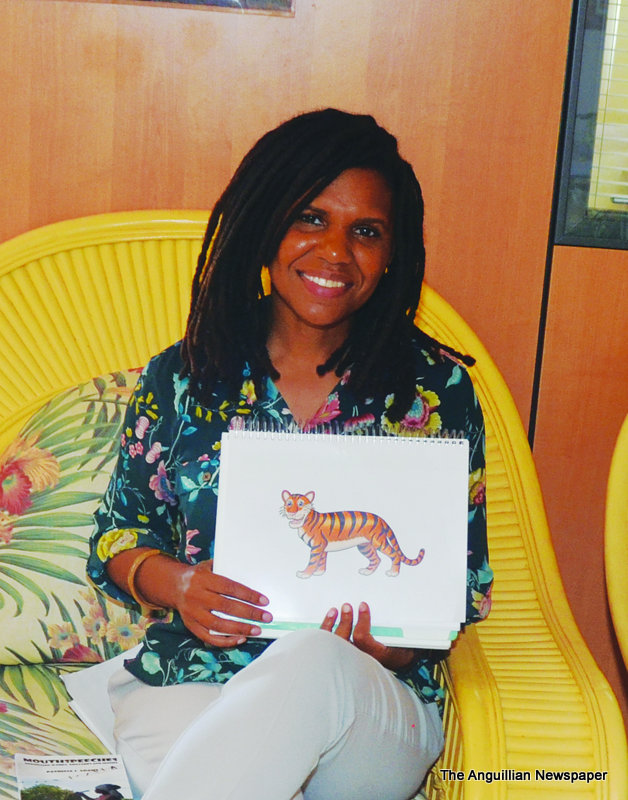Back home from Ohio, is Anguillian national Dr. Amber Desiree Franklin. Dr. Franklin was born in the US Virgin Islands and spent most of her life in Canada. Notwithstanding, she is of a rich Anguillian heritage, the first child of Steven and Cheryl Franklin, now residing in Bad Cox Village.
Dr. Franklin is an Associate Professor at the Miami University in Oxford, Ohio. (Less there be any confusion to the notion of Miami in Ohio, Amber explained that this is not in Florida, but it is the name of the area in Ohio where the university is located, and where the Miami Indian tribe resided over many years in US history).
She is a Speech Language Pathologist, and her career takes her into the treatment of young children with communication difficulties due to speech deficits caused by accents and flawed dialects. She is currently researching speech traits in Anguillian children, through her project called “The Anguilla Speech and Language Project”. She is working with Ms. Sandra Fahie and Mrs. Tracelyn Hamilton of the Department of Education, both of whom have been very supportive.
Dr. Franklin has studied how languages and speech patterns change as a result of regular contact with other language groups due to geographic locations and culture. She also conducts assessment on speech flaws and provides treatment for children’s speech disorders through speech therapy.
She explained: “Speech Pathologists do remedial treatment for children who have speech disorders. It depends on the age of the child. There are children who have speech disorders in the public schools, and it is important that their condition is identified as early in their lives as possible. The earlier that a pathologist can address the speech language disorder, the greater would be the chances of success to overcome it.
Asked what was the difference between a speech impediment and a language disorder, Dr. Franklin explained extensively: “For example, stuttering is a speech disorder or impediment that is distinct from a language disorder. However, sometimes there might be what is known as co-occurrence of a language disorder and speech impediment.

“An example is: we know that some children who have speech disorders may have trouble with reading in terms of decoding and phonological awareness. It is the understanding that words are made up of smaller component parts or syllables, which can be further broken down into individual speech sounds and patterns. Those speech sounds can be then manipulated to change words that have different meanings.”
The doctor was asked how all of this applies to a child who may have a mild hearing impediment. She responded: “There is an important link between hearing and speech. If a child suffers at an early age from ear infections, his or her perception of words would be affected. One needs to be able to properly perceive speech sounds in order to produce speech accurately. Therefore, attending to things like ear infections early in the child’s life is very important.
“We know that people who have impaired hearing also generate impaired speech sounds, especially for those speech sounds that tend to be higher pitched — like the “s” that would affect word endings. So a child with even a mild hearing impairment might not be able to pick up when a past tense sound is added to the root word.”
Dr. Franklin was asked how she was co-relating her research in Anguilla with her profession as a speech pathologist and a professor at the Miami University. She replied: “One of the things that is important for me is teaching my graduate students to distinguish speech disorders from speech differences. Speech differences are related to dialect, accent, and language.
“Speech disorders, on the other hand, are distinct from those. In order to be able to distinguish a speech disorder from a speech difference, people need to be educated on the different kinds of dialects that exist. One of my concerns is that many of the tests and assessments that have been created have not really been created with Caribbean children in mind.
“What I am doing in my research here is to record Anguillian children and teenagers as they read words from this popular assessment. Then I will be documenting the different kinds of pronunciations — typical pronunciations that Anguillian children will produce for these various words in this assessment book. There is little or no publication of Anguillian dialect in academic literature.
“A lot of the research having to do with Caribbean English is focused on Jamaica. But the Eastern Caribbean islands have their own dialect, as well, which must be documented both for the sake of children here on the island, as well as for the children who may go abroad for a period of time, so that people in other countries would be able to identify with the Anguillian dialect.”
Dr. Franklin was excited to tell how successful her efforts are. She noted: “I am progressing quite well, in fact. I have been able to receive much support from the Education Department, and I appreciate that.”
She wishes to thank Mrs. Tracelyn Hamilton and Ms. Sandra Fahie for their willingness to provide her with their kind assistance.







